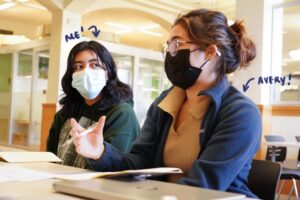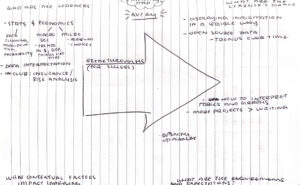By Sofia Hernandez, Undergraduate Library Research Fellow, 2023-2024
I joined the ULF program three years ago as an emerging sophomore, eager to enter the world of university libraries. I am now entering the final stretch of my undergraduate career, time flies when you’re having fun! Throughout these last three years, I’ve had the pleasure of working alongside like-minded Fellows and passionate librarians to bridge the gap between the undergraduate population at Cal and research.
In the past year, the Research fellows began our in-person Research Appointments to aid other undergraduates in getting started with navigating university resources to conduct research, an entry point that is often inaccessible to the larger undergraduate population. Rather than meeting with faculty members, students at the library had the option of connecting with a peer (AKA us!) for support in their assignments. In connecting with other undergraduates through the Fellow’s Research Appointments, I learned how to adapt to various learning styles and adjust my support/advice on a case-by-case basis.
This academic year, the Research Fellows were given the opportunity to lead between 3-4 “Research 101” workshops per semester in addition to hosting Research Appointments. Before our first workshop, I remember feeling incredibly nervous at the thought of presenting to a room full of students. However, the nerves quickly settled as I began to teach at the front of the class. Hosting Research 101 is similar to our Research Appointments; both provide a safe space for undergraduates to ask questions about the library and their writing without the fear of being judged by an adult figure of authority. Leading Research 101’s quickly became my favorite part of the fellowship. After a workshop, I’d often say to Avery (my most frequent Research 101 partner) that the front of the Doe 223 classroom often felt like a stage and we were the performers–that’s how much fun I had talking to folks! With each workshop, we’d continuously try to improve upon and even experiment with the flow of the presentations. We’d make adjustments to the order of slides, experiment with switching speaking roles, and most importantly, connect with our attendees at the end similarly to our one-on-one Research Appointments.
As I approach my upcoming graduation, I’ve had time to reflect on my participation on campus and can confidently say that I have left my mark at the Berkeley library. This upcoming fall, I will continue to foster my passion for librarianship as a MLIS graduate student. Though my time working at Berkeley’s libraries is coming to an end, I will continue to remain committed to the mission of providing equitable and transformative support for library patrons and students, one library at a time!

